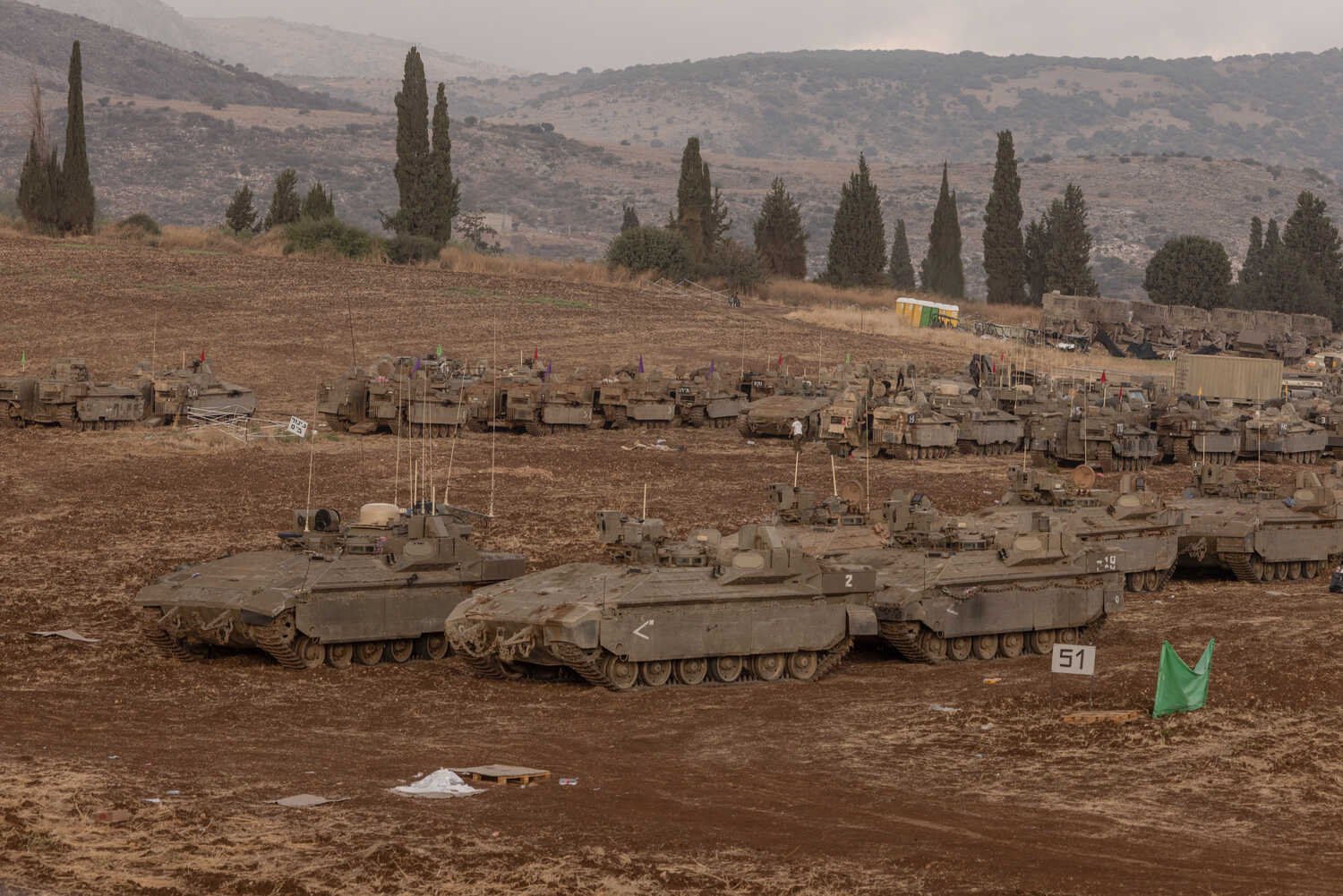In a bold and potentially risky, Israeli forces rolled into southern Lebanon in a ground war aimed to smash the infrastructure of Hezbollah, and destroy the group’s capacity to fire more missiles on Israel’s northern communities. A serious escalation of the conflict with Hezbollah, the Israeli military told CNN, was fully underway. The Katyusha rockets launched from the border between Lebanon and Israel have become the key emblem of the current conflict. Almost 2,000 missiles have been fired into Israel during the past fortnight, forcing the mass evacuation of civilian populations in the North Israeli towns lying within missile range. The Israeli government has pulled its people out of the Lebanese capital and advised its citizens to evacuate. If the ground incursion works, Israel’s air campaign will transform into an all-out assault aimed at killing Hezbollah’s leaders and destroying their assets. But will it? Because Hezbollah’s capabilities are far greater than those of Hamas, the incursion into southern Lebanon risks turning into a quagmire for the Israeli army.
Details of the Ground Invasion
Israeli forces, including at least one division of more than 10,000 soldiers, have entered Lebanon to engage in ‘limited, localized, and targeted raids’ against Hezbollah positions. The forces are deploying along the southern border region, where Hezbollah has dug in for decades. Although Israeli officials describe the operation as significantly smaller than Israel’s recent ground offensives in Gaza, the magnitude of troop deployments suggest that a campaign well beyond the targeted raids they claim will take place is in the works. Israeli officials have also hinted that some of the forces will push more than a few miles into Lebanon to destroy key Hezbollah infrastructure. Israeli authorities also called on Lebanese civilians in more than two dozen villages to evacuate further north, an ominous signal that fighting could escalate.
Hezbollah: A Stronger Adversary than Hamas?
Most of all, Israel and international onlookers need to know whether the Jewish state is prepared, militarily and psychologically, for the full extent of Hezbollah’s military capabilities. Though Israel has experience with conflict with nearby Hamas in Gaza, Hezbollah represents a substantially greater challenge. The militant organisation, backed by Iran, is vastly better armed and better trained than Hamas. Since the war it fought with Israel in 2006, Hezbollah’s arsenal has swelled. The group is estimated to have as many as 130,000 rockets, with a large percentage potentially reaching as far as Israel’s second-largest city of Haifa. Additionally, in recent years, Hezbollah fighters have gained valuable combat experience in neighboring Syria where they have been fighting on behalf of the government of Bashar al-Assad in the Syrian Civil War. This experience has increased their operational readiness and their battlefield acumen.
It also has one of the most extensive stockpiles of missiles in the Middle East. Hezbollah’s leaders have built an elaborate network of approximately 5,000 tunnels and fortified positions in southern Lebanon, which would make any Israeli incursion far more dangerous than previous operations against Hamas in Gaza. Hezbollah’s flexibility in fighting a guerrilla war in Lebanon’s hilly landscape means that Israeli troops risk being pulled into a drawn-out, bloody conflict. The last time Israel fought Hezbollah, back in 2006, its war against Lebanon killed more than 1,000 Lebanese and more than 100 Israelis. By any analysis, this time around is likely to be at least as bad.
Israel’s Strategic Calculations
Israel’s public rationale for this operation is to destroy Hezbollah’s infrastructure along the border and secure the quiet of Israel’s northern communities. In recent months, Hezbollah has stepped up its attacks against Israel, often firing rockets in support of Hamas. In response, Israeli forces have fired airstrikes, targeting Hezbollah leadership and military infrastructure, including two strikes near Beirut this week. Nevertheless, though Israel’s ground incursion has been limited thus far, there is growing speculation that the invasion could expand into a broader campaign.
Though it has prevailed on the battlefield in Lebanon in the past, Israel has never scored the kind of decisive military victory that has given it real security along its northern frontier — a fact that was again apparent in the 2006 war. Most Israeli commentators fear that the current campaign could turn into a bloody quagmire, especially if — as many suspect — Hezbollah is determined to make this a war of attrition. From Entree to Invasion (1984) by Anthony Borden is published via http://www.MiddleEastOnline.org.
U.S. Involvement and the Potential for Broader Conflict
The US has been watching the developments closely and Biden’s administration has been in touch with Israeli officials regularly. US officials report that Israel is assuring Washington that this operation will not be escalated into a full-scale invasion of southern Lebanon, which Biden’s National Security Advisor Jake Sullivan deemed ‘unwise and unnecessary’. However, US military leadership, including Austin III the defense secretary, have discussed with Biden about the possibility of escalation. On Monday, the Pentagon announced it was sending another 1,500 US troops to the Middle East to augment the 40,000 already stationed in the Middle East. It is a clear signal that the US is preparing for a larger regional conflict with Hezbollah and Iran along with the other states of the Middle East.
Hezbollah is also an Iranian proxy, and Washington has long seen it as a key component in a broader Iranian strategy for forcing the retreat of Israeli and US power from the region. Iran’s involvement means that the regional stakes for any sustained conflict between Israel and Hezbollah will be much higher. It would be only a matter of time before the conflict drew in Iran and its other main regional proxies, such as the Houthis in Yemen and Shia militias in Iraq and Syria. A conflict that was once between Israel and Hezbollah would rapidly escalate into a multi-front war. Tehran has a long history of arming, training and funding Hezbollah.
Airstrikes Continue in Beirut
In the meantime, the Israeli Air Force kept pummeling the skyline around Beirut at night with its bombing campaign. According to eyewitness reports, large explosions erupted in the Dahiya, a residential neighborhood in southern Beirut controlled by Hezbollah. This area also hosts a number of weapons factories and military headquarters for Hezbollah. Footage shows that airstrikes lit up the night sky in heavily populated areas.
What’s Next?
As Israel’s ground invasion of southern Lebanon continues, many are asking whether it will spin into a full-blown war. In modern times, Israel’s operations inside Gaza territory, especially last October’s ground incursion, have often begun with limited goals but quickly became major military campaigns involving tens of thousands of Israelis. Given that Hezbollah is a far more effective and entrenched enemy than Hamas, Israel could find itself involved in a protracted and difficult conflict.
Moreover, Israeli civilian life is also being disrupted as the military authorities have imposed new restrictions in key cities such as Jerusalem and Tel Aviv, which might signal that they expect there will be reprisals from Hezbollah – and possibly Iran. Hezbollah has already claimed to have been behind missile strikes against a number of targets in Israel, including the Glilot base to the north of Tel Aviv, which is the home of the Mossad intelligence agency, while residents have been urged to take shelter as sirens have sounded across central Israel.
The rest of the world watches nervously, while diplomatic efforts continue to curb the fighting. But so long as Israeli forces go deeper into Lebanese territory, the chances of a broader, deadlier conflict grow. At this point, the key question is: will Israel’s limited war against Hezbollah and its Iranian backers end up costing the Jewish state dearly, or will this operation achieve its limited aims and restore calm to Israel’s northern border?
For continued updates, visit The New York Times and The Washington Post. Photo: The New York Times

